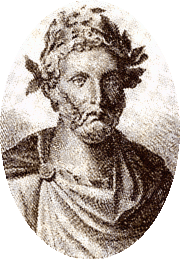
Mostellaria is a play by the Roman author Plautus. Its name translates from Latin as The Haunted House (with the word Domus understood in the title). It is a comedy with a very linear plot. It is set in the city of Athens, on a street in front of the houses of Theopropides and Simo.
Characters[edit]
- Titus Maccius Plautus. Titus Maccius Plautus is the biggest Roman comedy writer. He lived between 254 and 184 BC. He worked as a stage worker, actor in Rome and then he got himself into some debts and became a slave. Plautus style, filled with folk talk and jokes, became a role model to many other writers.
- Plautus Casina Summary; The Haunted House Plautus Summary; Plautus: Plautus, great Roman comic dramatist, whose works, loosely adapted from Greek plays, established a truly Roman drama in the Latin language. Little is known for certain about the life and personality of Plautus, who ranks with Terence as one of the two great Roman comic dramatists.
- Plautus, great Roman comic dramatist, whose works, loosely adapted from Greek plays, established a truly Roman drama in the Latin language. Little is known for certain about the life and personality of Plautus, who ranks with Terence as one of the two great Roman comic dramatists.


Main characters[edit]
Plautus Biography. Titus Maccius Plautus is the biggest Roman comedy writer. He lived between 254 and 184 BC. He worked as a stage worker, actor in Rome and then he got himself into some debts and became a slave. Plautus style, filled with folk talk and jokes, became a role model to many other writers. The Brothers Menaechmus Summary and Study Guide. Thanks for exploring this SuperSummary Study Guide of “The Brothers Menaechmus” by Plautus. A modern alternative to SparkNotes and CliffsNotes, SuperSummary offers high-quality study guides that feature detailed chapter summaries and analysis of major themes, characters, quotes, and essay topics.
- Theopropides - an Athenian merchant
- Philolaches - Theopropides' son
- Tranio - Slave owned by Theopropides
- Philematium - A courtesan who has been set free by Philolaches
- Callidamates - Friend of Philolaches
- Simo - Theopropides' neighbour
- Misargyrides - A moneylender
Minor characters[edit]
- Grumio - Country slave, owned by Theopropides
- Sphaerio - Slave owned by Theopropides
- Scapha - Philematium's attendant
- Delphium - Callidamates' girlfriend
- Phaniscus - Callidamates' slave
- Pinacium - Callidamates' slave
Plot[edit]

A young man named Philolaches is having a great time while his father Theopropides is overseas on business. Philolaches has borrowed a lot of money to buy the freedom of the slave-girl he loves. One day, he is having a house party with many friends, when his slave Tranio interrupts the merry-making to announce that Philolaches' father has returned unexpectedly and will arrive from the harbour at any minute. Amid the general panic, Tranio has an idea. He hustles Philolaches and his friends into the house and locks the door. The father now arrives. Tranio greets him respectfully but pretends that it is dangerous to enter the house because it is haunted.

Unfortunately, at this moment a money-lender turns up to claim the money that Philolaches borrowed. Tranio thinks quickly and pretends that the money was borrowed to buy the house next door. Even after Philolaches' father meets the real owner of the house, Tranio manages to hide the truth for some time, but he is finally found out and jumps on top of an altar to escape punishment. Fortunately, all ends happily when one of Philolaches' friends offers to repay the debt, allowing the father to forgive his son. Even Tranio is forgiven.
Adaptations[edit]
Mostellaria is one of several Plautus plays used as inspiration for the Stephen Sondheim, Burt Shevelove and Larry Gelbart musical 'A Funny Thing Happened on the Way to the Forum'. The character Erroneous returns from being abroad to be told his house is haunted and must walk seven times around the seven hills of Rome to remove the ghosts.
Kevin P. Joyce's play When the Cat's Away is loosely based on Mostellaria, transposing the story from Athens to modern day Nantucket.
Rachel Beth Cunning simplified and adapted the play to create more comprehensible reading materials for Latin 3 and Latin 4 students in a high school classroom.[1]
References[edit]
| Wikimedia Commons has media related to Mostellaria. |
Plautus Casina Summary
- ^Cunning, Rachel. 'Mostellaria: An Adapted Latin Play'. Bombax Press.
Plautus Pseudolus Summary
- Plautus, The Rope and Other Plays, translated by E. F. Watling, Penguin, London, 1964, ISBN0-14-044136-0.